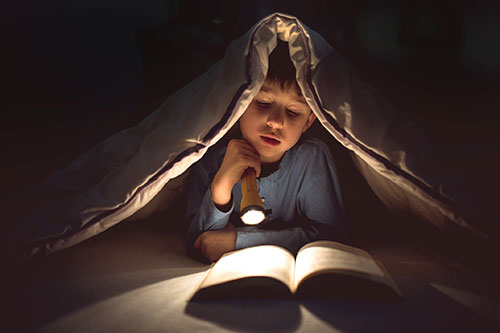What was your first book? Not the first ‘once upon a time’ you remember. Not the first story you got a gold star for getting all the way through. But the first book that belonged to you. The book with your name in the front that lived on a shelf by your bed – the book whose pages knew only your fingers. A book of one’s own.
Mine was a children’s encyclopaedia called KNOWLEDGE. It was bigger than a school jotter and a rich-looking red. On the front it had close-up pictures of a bumblebee, hieroglyphics and an equally indecipherable green circuit board (because computers were the future in 1986). The tagline was: ‘Discover amazing facts about our world’. And I did. I learned all about the Industrial Revolution and the water cycle and the Commonwealth. Because it was a hardback, the facts felt even weightier. I could be surer of them, and myself, because it took some effort to hold up in bed.
My mum couldn’t afford books, but she knew stories were fuel just as vital as gas and electricity
Facts are now alternative, fewer bumblebees buzz and our amazing world is governed by those circuit boards. But I still have that book. I am only a writer now because I was a reader then. And not just a devourer of books but an owner of them. KNOWLEDGE was power.
I was given that first vital book by Social Services along with The Chronicles of Narnia. There was no way my mum could afford books when she was struggling with bills. But she knew stories were fuel just as vital as gas and electricity, so she registered us for that scheme.
At first, I was embarrassed getting books from the council but got over it when I went through the back of the wardrobe. Just because we couldn’t afford books doesn’t mean we didn’t deserve them. In fact, we needed them all the more. Books are a pleasure not a luxury. They are that rarest of things: a joy that is also improving! Like some delicious magical chocolate dreamed up by Roald Dahl that also makes you slim.
Yet books are still seen as the province of the middle class. There are no bookshops on council estates. Hay-on-Wye, home of one of Britain’s biggest literary festivals, is next door to Merthyr Tydfil, which has one of the highest populations of people lacking basic literacy. Let the poor eat reality TV.










